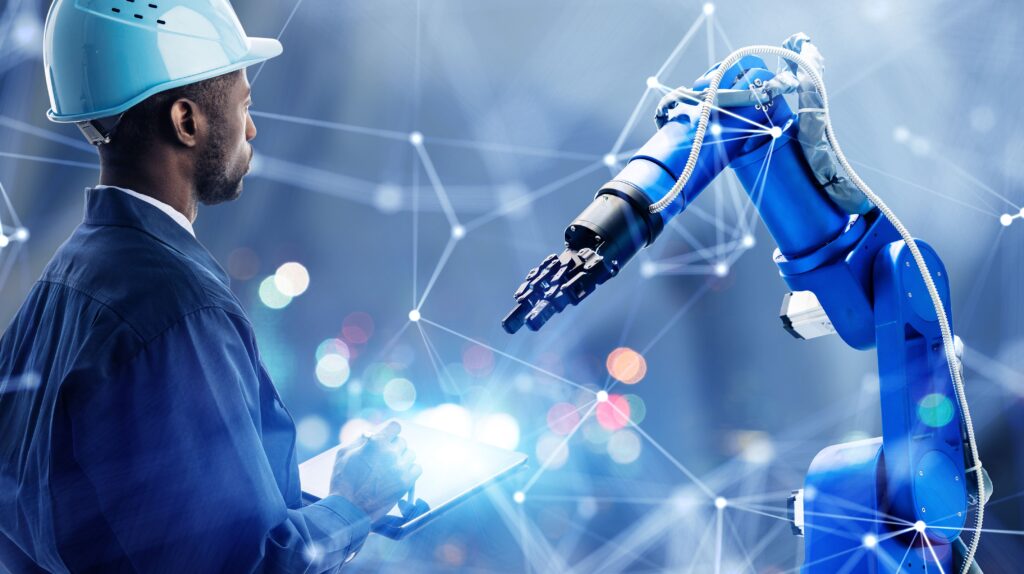The manufacturing industry is undergoing a profound transformation driven by technological advancements such as manufacturing software development and generative AI. These innovations are reshaping traditional processes, enhancing efficiency, and unlocking new possibilities for manufacturers worldwide. Let’s explore the transformative potential of these cutting-edge technologies.

Manufacturing Software Development: Empowering Industry
In the era of Industry 4.0, manufacturing software development plays a pivotal role in driving digital transformation and operational excellence. From shop floor automation to supply chain management, bespoke software solutions cater to the unique needs and challenges of modern manufacturers.
These software solutions encompass a wide range of capabilities, including:
- Production Optimization: Streamlining manufacturing processes, reducing lead vc btimes, and minimizing waste through advanced scheduling algorithms and real-time monitoring systems.
- Quality Control: Implementing robust quality control measures, leveraging AI-powered inspection systems and predictive analytics to ensure product quality and compliance with industry standards.
- Supply Chain Integration: Enhancing visibility and collaboration across the supply chain, from procurement to distribution, with integrated software platforms and data analytics tools.
- Asset Management: Maximizing asset performance and reliability through predictive maintenance algorithms, remote monitoring, and digital twin technologies.
By harnessing the power of custom software development, manufacturers can gain a competitive edge, drive innovation, and adapt to evolving market dynamics with agility and precision.
Synthetic Data: Fueling Innovation in AI
As the demand for data-driven insights grows, so does the need for diverse and representative datasets. However, acquiring labeled data for AI training can be costly, time-consuming, and limited in scope. Enter synthetic data – a revolutionary approach to generating artificial datasets that mimic real-world scenarios with unprecedented accuracy and diversity.
Synthetic data offers several advantages, including:
- Data Diversity: Generating datasets spanning various demographics, environments, and conditions, enabling robust AI models capable of generalizing across diverse contexts.
- Privacy Preservation: Mitigating privacy concerns associated with sensitive or proprietary data by generating synthetic alternatives for training and testing AI algorithms.
- Scalability: Scaling AI initiatives by generating large volumes of labeled data rapidly and cost-effectively, accelerating model development and deployment.
- Domain Adaptation: Generating synthetic data tailored to specific domains or use cases, facilitating transfer learning and adaptation of pre-trained models to new environments.
By harnessing synthetic data, organizations can overcome data scarcity and accelerate AI innovation across industries such as healthcare, finance, and autonomous vehicles.
Generative AI: Pushing the Boundaries of Creativity
Generative AI, fueled by advanced deep learning techniques, empowers machines to create, imitate, and innovate across various domains, from art and music to text and imagery. By learning patterns and structures from existing data, generative AI models can generate novel and realistic outputs that defy traditional boundaries of creativity.
Applications of generative AI include:
- Content Generation: Creating multimedia content, including images, videos, and music, with remarkable realism and diversity, opening new avenues for digital media production and creative expression.
- Design Exploration: Assisting designers and engineers in exploring diverse design options, generating prototypes, and optimizing product performance through generative design algorithms.
- Personalization: Tailoring user experiences and recommendations based on individual preferences and behaviors, enhancing customer engagement and satisfaction across digital platforms.
- Data Augmentation: Generating synthetic data augmentations for training AI models, enhancing robustness and generalization capabilities without the need for additional labeled data.
By embracing generative AI, organizations can unlock new levels of creativity, efficiency, and innovation, driving value creation and differentiation in an increasingly competitive landscape.
Conclusion
In conclusion, manufacturing software development and generative AI development represent two pillars of innovation reshaping the manufacturing landscape. By harnessing advanced software solutions and AI technologies, manufacturers can optimize operations, accelerate innovation, and stay ahead of the curve in an era defined by digital disruption and rapid change.